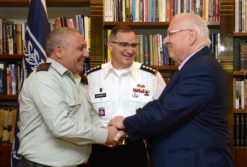
Pres. Rivlin, IDF Chief-of-Staff Eisenkot & US Gen. Scaparrotti. Photo courtesy of Kobi Gideon (GPO)
Just days after Iran threatened to destroy Israel with missiles yet again, Israeli Prime Minister Benjamin Netanyahu is discussing the Islamic Republic with two of the most powerful leaders in the world—in the same week. With a trip to Moscow for Netanyahu to meet Russian President Vladimir Putin planned for Thursday, United States President Donald Trump called Netanyahu on Monday.
A readout of the call from Netanyahu’s office said that the he and Trump “spoke at length about the dangers posed by the nuclear deal with Iran and by Iran’s malevolent behavior in the region and about the need to work together to counter those dangers.” That follows threats against Israel of further dangers from Tehran just last week, in which an Iranian general warned his nation could launch thousands of missiles at the Jewish State.
Iran’s semi-official Fars News Agency quoted senior Iranian army commander Brigadier General Fereidoun Nouri as saying last Friday that all the Israeli government facilities are within their missile range. He also threatened that if Israel does a “thing” of aggression against them, Iran could “raze down” the Israeli government “forever.”
A readout of President Trump’s call with Netanyahu on Friday didn’t specifically mention Iran or the missile threat, but did say that the leaders “discussed the need to counter continuing threats and challenges facing the Middle East region,” according to the White House website.
Meanwhile, President Trump wasn’t the only U.S. official discussing regional threats with Israeli leaders. The head of the US European Command, General Curtis M. Scaparrotti, met with Israeli President Reuven Rivlin and IDF Chief-of-Staff Lt.-Gen. Gadi Eizenkot on Monday morning.
According to a recap of their discussion released by Rivlin’s office, they “spoke about the developments across the region and of the importance of cooperation between all parties in battling the threat of terrorism, which they noted required a united front.”
The press release said that Rivlin “reiterated Israel’s appreciation for the U.S.’s support for Israel, and its need to carry the burden of security.”
(By Joshua Spurlock, www.themideastupdate.com, March 6, 2016)
